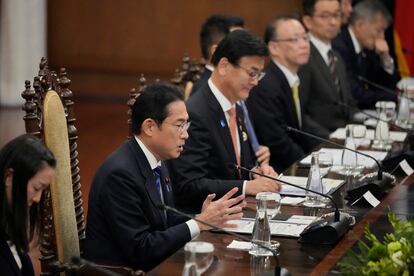Japan and Philippine leaders agree to negotiate defense pact and boost ties amid China’s aggression
The Philippines will be the first beneficiary of a newly launched Japanese security assistance program for allied militaries in the region

The leaders of Japan and the Philippines agreed Friday to start negotiations for a key defense pact that would allow their troops to enter each other’s territory for joint military exercises. The move is part of efforts to strengthen their alliance in the face of China’s alarming assertiveness in the region.
Japanese Prime Minister Fumio Kishida, who is on a two-day visit to Manila, also announced after holding talks with President Ferdinand Marcos Jr. that a coastal surveillance radar would be given to the Philippines through a grant. The country is the first beneficiary of a newly launched Japanese security assistance program for allied militaries in the region.
Additional Japanese patrol vessels, defense equipment and radars would be provided to strengthen the Philippines’ law enforcement capability at sea, Kishida said. Japan has supplied a dozen patrol ships in recent years to the Philippines, which are now largely using them to defend its territorial interest in the disputed South China Sea.
Japan has had a longstanding territorial dispute with China over islands in the East China Sea. There has been a series of tense confrontations, meanwhile, between Chinese and Philippine coast guard and navy ships in the disputed South China Sea.
Two weeks ago, China’s ships separately blocked then hit a Philippine coast guard vessel and a supply boat near the disputed Second Thomas Shoal in the South China Sea. Japan immediately expressed its strong support to the Philippines and the United States renewed its warning that it’s obligated to defend its treaty ally if Filipino forces come under an armed attack in the contested waters.
“We shared serious concerns about the situation in the East China Sea and the South China Sea and that attempt to unilaterally change the status quo by force is unacceptable,” Kishida said, through a translator, in a televised news conference with Marcos on Friday night.
Marcos said the proposed defense pact to be negotiated by the Philippines with Japan, called the Reciprocal Access Agreement, would be beneficial “both to our defense and military personnel and to maintaining peace and stability in our region.”
On Saturday, Kishida will become the first Japanese premier to address a joint session of the Philippine congress, underlining how the Asian nations’ ties have transformed since Japan’s brutal occupation of the Philippines in World War II.
He’s scheduled to visit a Japanese-funded Manila subway project Saturday and board one of a dozen Japanese-built coast guard patrol ships docked in Manila before leaving for Malaysia.
“We look forward to the address of a leader of a nation that is a robust trading partner, a strong security ally, a lending hand during calamities and an investor in Philippine progress,” Senate President Juan Miguel Zubiri said.
Kishida’s government unveiled plans in December to build up its security and defense — including counterstrike capability — in a major shift from the country’s self-defense-only principle adopted after the last world war.
Under the new strategy, Japan will utilize its huge development aid to support efforts by poorer nations like the Philippines to strengthen their security capabilities and improve safety at sea as China flexes its military muscle in the region.
Kishida said he and Marcos Jr. agreed to press efforts to reinforce the three-way security ties of Japan, the United States and the Philippines.
Those objectives dovetail with Marcos Jr.’s thrust to strengthen his country’s external defense after a series of tense confrontations between Chinese and Philippine coast guard and naval ships in the disputed South China Sea.
President Joe Biden has also been strengthening an arc of alliances in the region to better counter China’s assertiveness.
The Reciprocal Access Agreement to be negotiated by Japan and the Philippines would allow Japanese and Philippine troop deployments to one another for military exercises and other security activities that could serve as a deterrent to aggression in the region, including joint patrols in the South China Sea. If finalized, the accord would be the most significant boost in the alliance of Japan and the Philippines in decades.
Sign up for our weekly newsletter to get more English-language news coverage from EL PAÍS USA Edition
Tu suscripción se está usando en otro dispositivo
¿Quieres añadir otro usuario a tu suscripción?
Si continúas leyendo en este dispositivo, no se podrá leer en el otro.
FlechaTu suscripción se está usando en otro dispositivo y solo puedes acceder a EL PAÍS desde un dispositivo a la vez.
Si quieres compartir tu cuenta, cambia tu suscripción a la modalidad Premium, así podrás añadir otro usuario. Cada uno accederá con su propia cuenta de email, lo que os permitirá personalizar vuestra experiencia en EL PAÍS.
¿Tienes una suscripción de empresa? Accede aquí para contratar más cuentas.
En el caso de no saber quién está usando tu cuenta, te recomendamos cambiar tu contraseña aquí.
Si decides continuar compartiendo tu cuenta, este mensaje se mostrará en tu dispositivo y en el de la otra persona que está usando tu cuenta de forma indefinida, afectando a tu experiencia de lectura. Puedes consultar aquí los términos y condiciones de la suscripción digital.








































